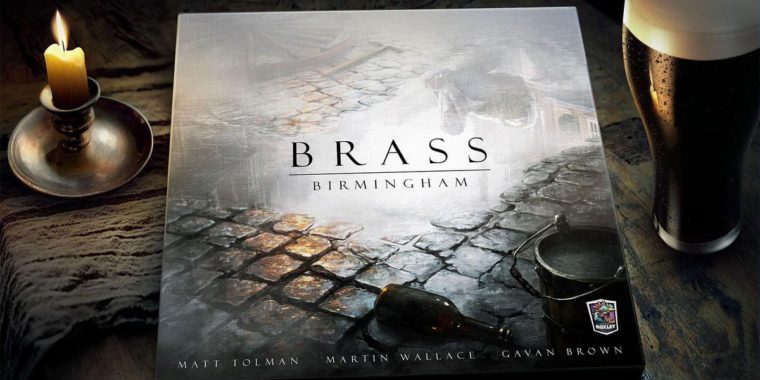Getting product quickly and efficiently to its destination is the foundation of industry. A foundation that has to be built. And you are the one to do it, or so you think. But others have the same idea. So can you outwit them to build Birmingham’s most successful industrial network?
Brass: Birmingham is a hand management and network building game for 2-4 players. It is built around Brass, created by Martin Wallace and published by Warfrog in 2007. Birmingham sees Gavan Brown and Matt Tolman make some additions and tweaks to Martin Wallace’s original mechanics, and is published by Roxley.
Each player possesses a player board with industry tiles placed upon it, a starting amount of money, double sided canal and rail tokens, as well as a hand of cards. Players have the same amounts and types of industry tiles, arranged in a sequential order that they must be built or discarded in. The resources and costs of the tiles vary, between each type as well as within a type.
The game involves players spending cards to perform actions. These actions allow them to place industry or links onto the board, take loans, trade with markets, and take wild cards to better prepare for future turns. Any of the player’s links which meet each other are considered the players network, and they do not necessarily have to run through a location the player has placed industry in.
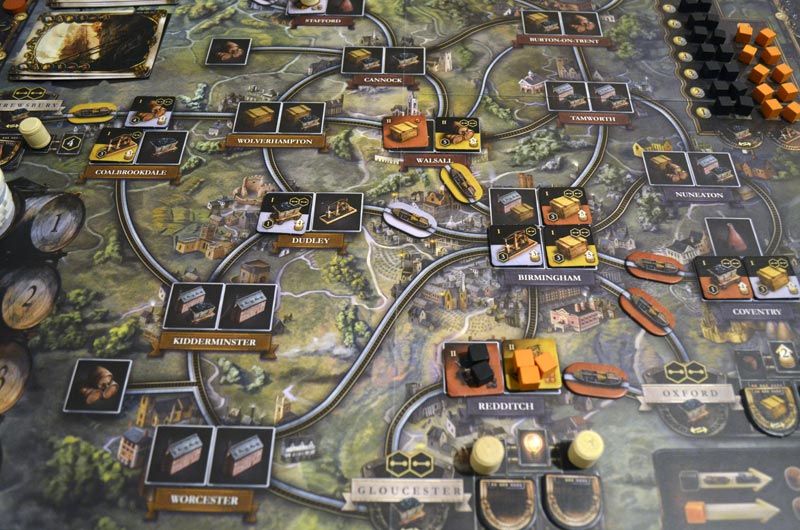
Cards come in two forms. Some correspond with a named location on the game board, while others display one or more particular industries. Playing a location card allows a player to build in that spot, while industry cards allow them to build that industry in any location that their network connects too. Wild cards can be purchased as an action, allowing players to place industry in any location or select any industry type to build in any location within their network.
When placed some industry is populated by resources. These are coal, iron and beer. Other industry tiles, like pottery, can be traded with the appropriate market for the indicated reward. Market locations don’t move, but at the start of each game what industry they trade for is randomly assigned. Once an industry is exhausted of resources or sold, the tile is flipped over and now contributes to scoring points.
Different resources can be accessed in certain ways, and not just by the player which placed them. Opposing players connecting their networks together gives them access to each other’s resources like coal and beer. They can also piggy back off each other to gain access to the various markets.
During their turn, when the players spend money, it is not returned to the bank. Instead the money is stacked on the players corresponding indicator on the board. At the end of all the players turns the turn order is rearranged, from the player who spent the least going first to the one who spent the most going last.
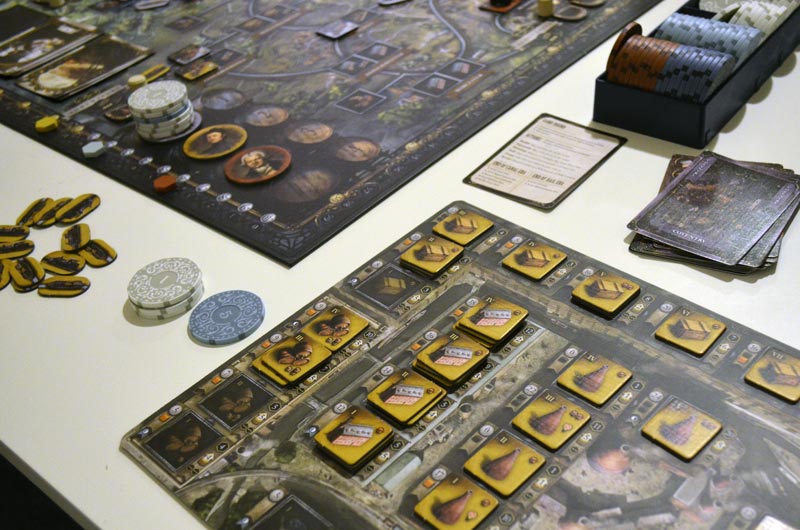
The game is divided into two eras. The first is the canal era, when only canals can be place. The second is the rail era, when only rail can be placed. Players take turns making two actions, and then refilling their hands. Once the deck is exhausted that era is over. At the end of the first era all canals are removed, as are all level 1 industries.
Points are calculated once each era ends. Players count the number of connection symbols in locations joined by a canal or rail link they own. It does not matter whether the industries displaying the connection symbols in the location belong to that player. The total for that link is how many points they score, and they do this for each link currently on the board. At the culmination of the game the player with the most points wins.
At the centre of the game are the player choices. Information that the players are given to inform their decisions is never completely random, but then it is never completely knowable either. The game excellently balances the two, injecting frequent randomisation into carefully laid plans. While at the same time achieving an understandable order from a cacophony of individual and conflicting actions.
Probably not by mistake the game tasks players with not only creating interconnecting networks, but also puzzling the most advantageous connections from even the direst of circumstances. Player’s decisions are chained together, not just physically on the board by locations and links, but by the very resources they do or do not place onto the board.
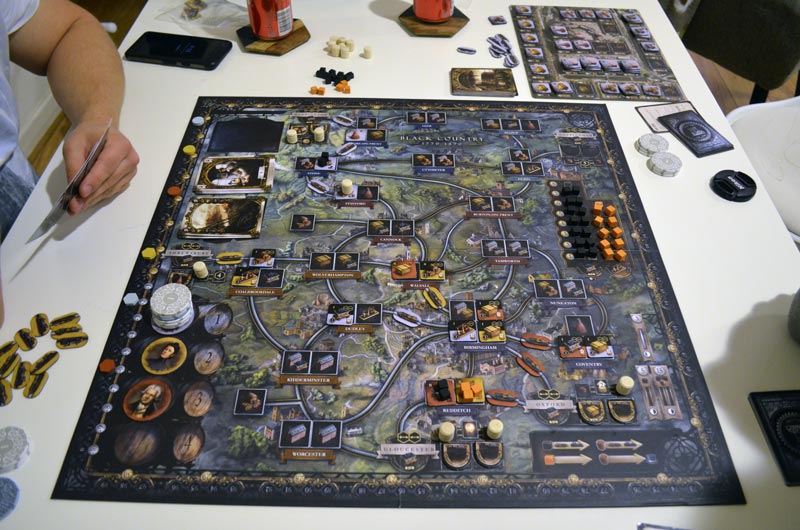
This is perhaps where Brass: Birmingham is the most impressive. More often than not, by placing links or locations, a player is helping all the other players. Whether they want too or not. They are providing the resources or access necessary for their competitors to grow their networks. But by the same token, when a player utilises an opponent’s resources they are moving that player one step closer to flipping a tile and potentially scoring even more points.
Not that the game doesn’t have its sore points. The two eras is a great idea, but it seems a lot of players have trouble fully understanding what will happen in the transition until they actually get there. Then they get to watch most of the infrastructure they placed wiped away, with no plan on what they should be doing in the next era.
So too the initial intricacy of the rules can be a stumbling block. Being able to tell what does and does not constitute a network is very particular, as are the requirements and limitations on where or when you can access locations and resources. There are guides on the board to try and help remind players, but there is so much going on that these disappear in amongst the other game essential items and frivolous details.
The game components are quite well produced. The poker chit coins are perhaps the most amazing part of the production. It gives the money a real feeling of weight and presence. The cards and tokens are nicely made. As is the board, though there could have been a bit more contrast between the game essential area and the superfluous background elements. Also, while impeccable in execution, the beer barrels seem out of place when compared to the basic cubes that are coal and iron.
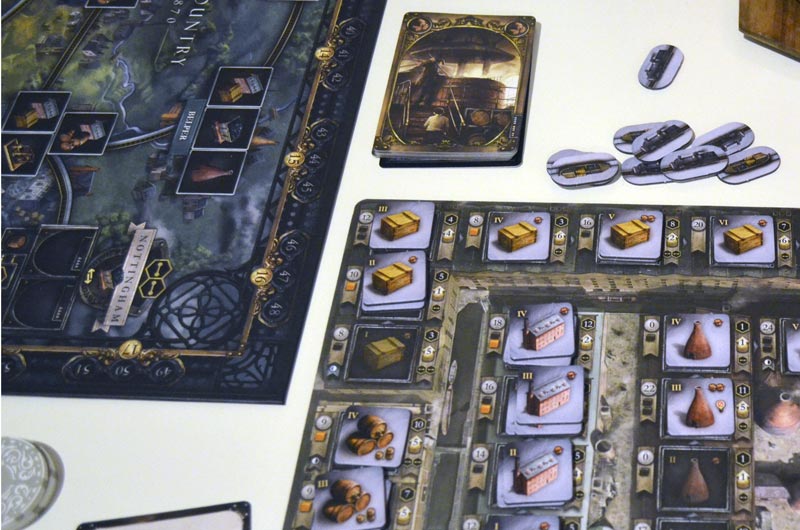
To be honest I was quite surprised by Brass: Birmingham and how much I enjoyed it. It is challenging and thoughtful, with a manageable complexity that somehow seems familiar yet different each play. The game hinges on long term strategy, but allows a lot of room for drastically changing plans or taking risks. And there is something almost cathartic about calculating the network points at the end of each era.
Players who have trouble remembering fiddly rules will likely run into some trouble, as will those who dislike games which remove portions of their progress. So Brass: Birmingham is ideal for players who enjoy lots of decision making, and want a game which gives them broad options each time they play.
Brass: Birmingham is designed by Martin Wallace, Gavan Brown and Matt Tolman. It is published by Roxley and available now online or from good tabletop retailers.


